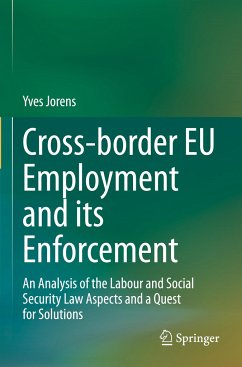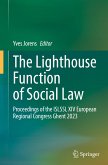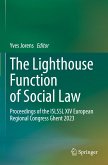This book provides insights into the complex labour and social security framework of EU employment and its enforcement. Starting from an analysis of the various EU instruments and case law, it outlines the complicated legal framework, the practical problems involved, and ways to overcome them. In turn, the book puts the evolution of the framework into perspective, reviews the numerous modifications made over the years, and describes interpretation-related difficulties. Since the formation of the European Community 65 years ago, migration and the European labour market have evolved considerably through special patterns of (temporary) mobility such as postings, simultaneous work in several Member States and high mobility, thus leading to major questions about the applicable legal framework. The interplay between the free movement of persons and services has produced a complex system of rules. Which law applies when a person crosses a border: that of the host State (and to what extent should this State take into account the legal rules from the home State?) or that of the home State? Does the person crossing the border have any choice in the matter?
The book subsequently analyses the penetration of EU (market) law into national systems of labour and social security law. The divergent solutions and views within labour and social security law are considered and discussed from a critical point of view.
As the positive elements of the European story are at risk of being overshadowed by the negative consequences of the European construction - social dumping being the prime example - special attention is paid to the cooperation between inspection services and other stakeholders in order to guarantee efficient enforcement. The latter is more than just sanctioning, but also includes prevention and monitoring issues.
The unique strength of this book is that it brings together all legal-technical aspects of cross-border employment and its enforcement in both labour law and social security law in a single volume. Readers will find a wealth of detailed and specialised information, helping them to understand the topic in depth. Accordingly, the book will be of interest to academics, practitioners, enforcement bodies, judiciary policymakers, advanced law students, and researchers seeking to understand the law in context.
The book subsequently analyses the penetration of EU (market) law into national systems of labour and social security law. The divergent solutions and views within labour and social security law are considered and discussed from a critical point of view.
As the positive elements of the European story are at risk of being overshadowed by the negative consequences of the European construction - social dumping being the prime example - special attention is paid to the cooperation between inspection services and other stakeholders in order to guarantee efficient enforcement. The latter is more than just sanctioning, but also includes prevention and monitoring issues.
The unique strength of this book is that it brings together all legal-technical aspects of cross-border employment and its enforcement in both labour law and social security law in a single volume. Readers will find a wealth of detailed and specialised information, helping them to understand the topic in depth. Accordingly, the book will be of interest to academics, practitioners, enforcement bodies, judiciary policymakers, advanced law students, and researchers seeking to understand the law in context.








